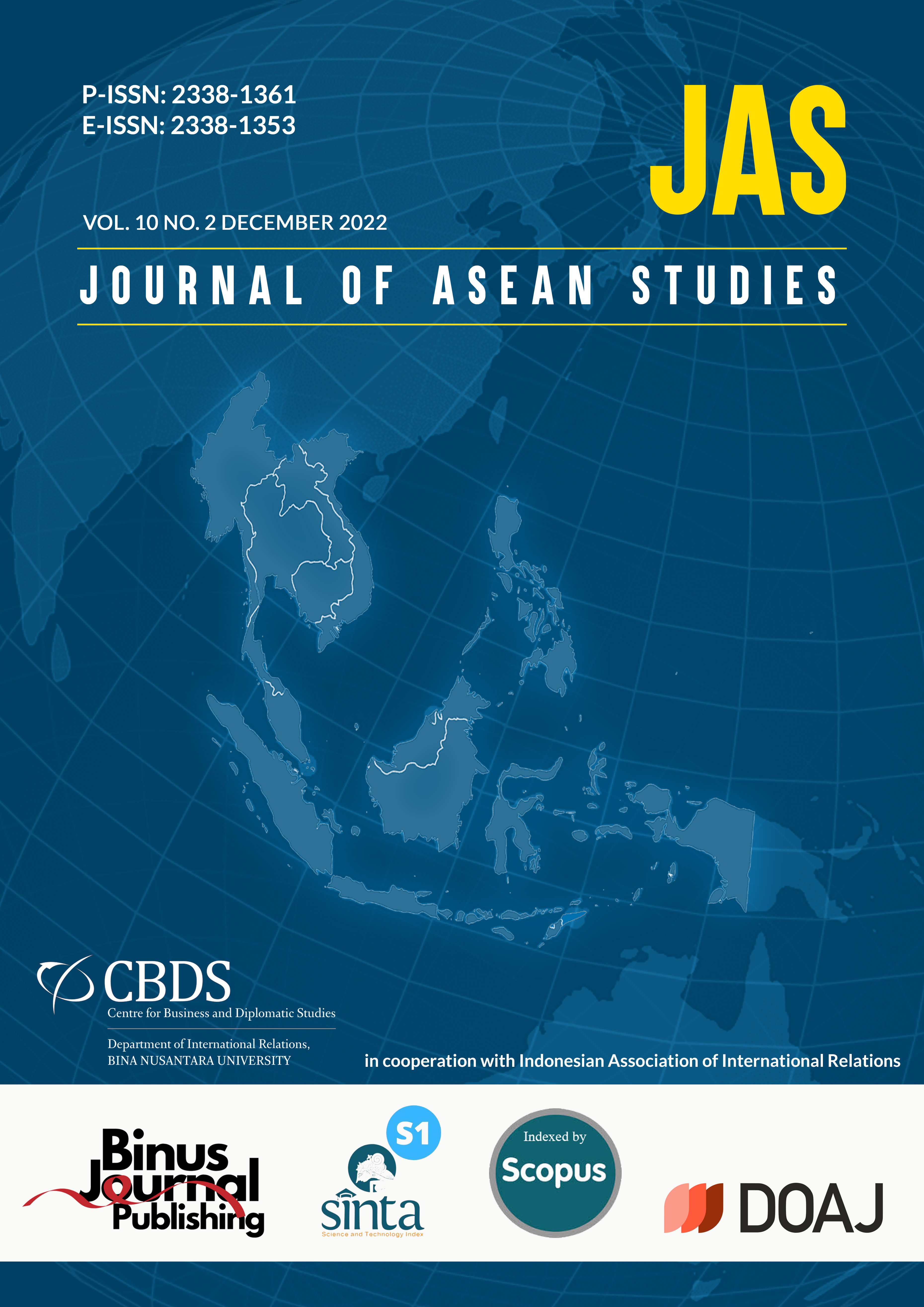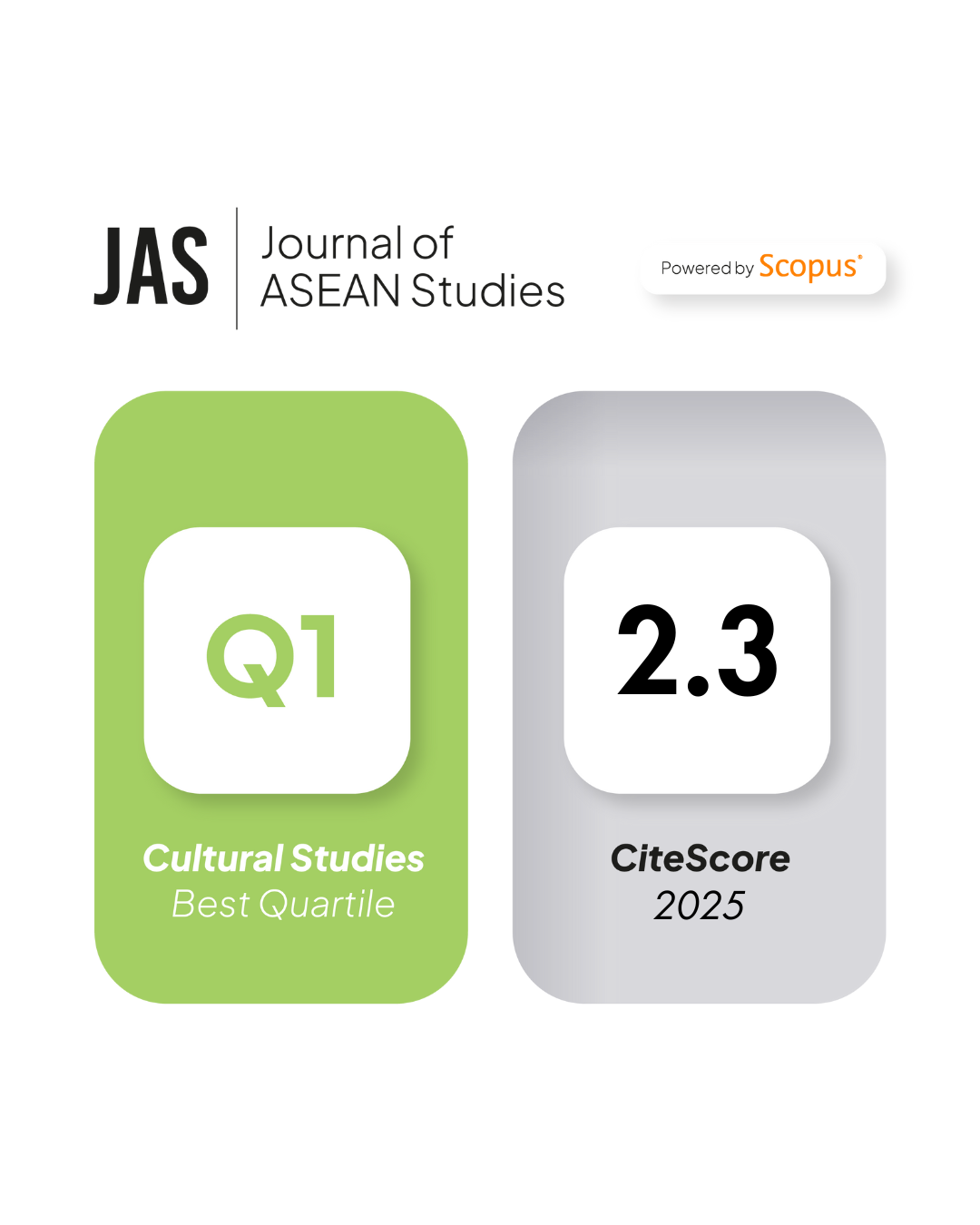Approaches to Indonesia's Foreign Policy: Area Studies, FPA Theory, and Global IR
DOI:
https://doi.org/10.21512/jas.v10i2.9059Keywords:
area studies, Global IR, Indonesia’s foreign policy, mainstream theories, multiplicity, non-Western identityAbstract
This article traces the evolution of Indonesia's foreign policy studies, highlighting the major theoretical and methodological trends that have shaped their current form. As a starting point, we introduce a discourse on non-Western Foreign Policy Analysis (FPA), having developed beyond the dominance of the Western-rooted International Relations (IR) discipline. The authors encounter that Indonesia's foreign policy studies evolve through two stages. The first stage occurred during the Cold War until the early 2000s. It demonstrated a scholarship development characterized by an attempt to promote a national-focused or area studies perspective, despite the influence of realism and positivism. The second stage, visible since the mid-2000s, shows the advancement of diverse theory-driven inquiries, having been moved by the younger generation of scholars more exposed to various theories and research methods in IR. Dealing with these two phases of the studies will likely build Indonesia's foreign policy studies' inclusive, critical, and unique identity. It can be realized by adopting and contextualizing approaches offered by state transformation theory, critical realism, and reflexive theorizing in IR to unpack the relatively overlooked aspects of Indonesia's foreign policy.
References
Abbondanza, G., 2022. Whether the Indo-Pacific? Middle power strategies from Australia, South Korea, and Indonesia. International Affairs, 98(2), pp.403-421.
Abdulgani, R. 1964. Nationalisme Asia (Asian nationalism). Second edition. Djakarta: Prapantja.
Acharya, A., 2014a, March. Global IR and regional worlds: beyond Sahibs and Munshis–a new agenda for International Studies. In Presidential Address to the 55th Annual Convention of the International Studies Association, Toronto (Vol. 27).
Acharya, A., 2014b. The end of American world order. Cambridge: Polity Press.
Acharya, A., 2014c. Indonesia matters: Asia's emerging democratic power Singapore: World Scientific.
Acharya, A., 2018. Constructing global order: agency and change in world politics. Cambridge: Cambridge University Press.
Acharya, A. and Buzan, B., 2019. The making of global international relations. Cambridge: Cambridge University Press.
Amiri, S. and Sevin, E., 2020. City diplomacy. Cham: Springer International Publishing.
Alden, C. and Aran, A., 2016. Foreign policy analysis: new approaches. Abingdon: Routledge.
Anwar, D.F., 1994. Indonesia in ASEAN: foreign policy and regionalism. Singapore: Institute of Southeast Asian Studies.
Beeson, M., 2017. Alternative realities: Explaining security in the Asia-Pacific. Review of International Studies, 43(3), pp.516-533.
Bhaskar, R., 1975. Feyerabend and bachelard: two philosophies of science. New Left Review, (94), p.31.
Beeson, M., Bloomfield, A. and Wicaksana, W., 2021. Unlikely allies? Australia, Indonesia and the strategic cultures of middle powers. Asian Security, 17(2), pp.178-194.
Braveboy-Wagner, J.A., 2009. Institutions of the Global South. New York: Routledge.
Brummer, K. and Hudson, V.M. eds., 2015. Foreign policy analysis beyond North America. Boulder: Lynne Rienner.
Cox, R.W., 1983. Gramsci, hegemony and international relations: an essay in method. Millennium, 12(2), pp.162-175.
Djalal, H., 1995. Indonesia and the Law of the Sea (p. 294). Jakarta: Centre for Strategic and International Studies.
Elisabeth, A. ed., 2016. Grand design: kebijakan luar negeri Indonesia 2015-2025 (The grand design of Indonesia’s foreign policy 2015-2025). Jakarta: Yayasan Pustaka Obor Indonesia.
Emmers, R., 2021. Democratization, national identity, and Indonesia's foreign policy. In Rozman, G. ed. Democratization, National Identity and Foreign Policy in Asia (pp. 141-154). Abingdon: Routledge.
Emmers, R. and Teo, S., 2015. Regional security strategies of middle powers in the Asia-Pacific. International Relations of the Asia-Pacific, 15(2), pp.185-216.
Eun, Y.S., 2019. An intellectual confession from a member of the “non-white” IR community: a friendly reply to David Lake’s “White Man’s IR”. PS: Political Science & Politics, 52(1), pp.78-84.
Eun, Y.S., 2022. Introduction: Southeast Asia in Global IR; a reflexive stocktaking in research and teaching. Contemporary Southeast Asia: A Journal of International and Strategic Affairs, 44(2), pp. 169-184.
Fiaz, N., 2014. Constructivism meets critical realism: Explaining Pakistan’s state practice in the aftermath of 9/11. European Journal of International Relations, 20(2), pp.491-515.
Gindarsah, I., 2012. Democracy and foreign policymaking in Indonesia: a case study of the Iranian nuclear issue, 2007–08. Contemporary Southeast Asia: A Journal of International and Strategic Affairs, 34(3), pp.416-437.
Hadiwinata, B.S., 2009. International relations in Indonesia: historical legacy, political intrusion, and commercialization. International Relations of the Asia-Pacific, 9(1), pp.55-81.
Hameiri, S. and Jones, L., 2015. Governing borderless threats: non-traditional security and the politics of state transformation. Cambridge: Cambridge University Press.
Hameiri, S. and Jones, L., 2016. Rising powers and state transformation: the case of China. European Journal of International Relations, 22(1), pp.72-98.
Hameiri, S., Jones, L. and Heathershaw, J., 2019. Reframing the rising powers debate: state transformation and foreign policy. Third World Quarterly, 40(8), pp.1397-1414.
He, K., 2008. Indonesia's foreign policy after Soeharto: international pressure, democratization, and policy change. International Relations of the Asia-Pacific, 8(1), pp.47-72.
Hill, C., 2015. Foreign policy in the twenty-first century. London: Palgrave Macmillan.
Holsti, K.J. and Holsti, K.J., 1996. The state, war, and the state of war. Cambridge: Cambridge University Press.
Hudson, V.M. and Day, B.S., 2019. Foreign policy analysis: classic and contemporary theory. Lanham: Rowman & Littlefield.
Kusno, A., 2003. From city to city: Tan Malaka, Shanghai and the politics of geographical imagining. Singapore Journal of Tropical Geography, 24(3), pp.327-339.
Jackson, V., 2014. Power, trust, and network complexity: three logics of hedging in Asian security. International Relations of the Asia-Pacific, 14(3), pp.331-356.
Jeong, M.S., 2019. Critical realism: a better way to think about middle powers. International Journal, 74(2), pp.240-257.
Jessop, B., 2007. State power. New York: Polity.
Karim, M.F., 2017. Role conflict and the limits of state identity: the case of Indonesia in democracy promotion. The Pacific Review, 30(3), pp.385-404.
Karim, M.F., 2019. State transformation and cross-border regionalism in Indonesia’s periphery: contesting the centre. Third World Quarterly, 40(8), pp.1554-1570.
Karim, M.F., 2021. Role legitimation in foreign policy: The case of Indonesia as an emerging power under Yudhoyono's presidency (2004–2014). Foreign Policy Analysis, 17(3), p.orab010.
Karim, M. F. (2021). When trade and foreign policy collide: Indonesia in Doha development round. The Pacific Review, 34(4), 605–632.
Kuik, C.C., 2016. How do weaker states hedge? unpacking ASEAN states’ alignment behavior towards China. Journal of Contemporary China, 25(100), pp.500-514.
Kurki, M., 2008. Causation in international relations: reclaiming causal analysis. Cambridge: Cambridge University Press.
Laksmana, E.A., 2011. Indonesia's rising regional and global profile: does size really matter?. Contemporary Southeast Asia: A Journal of International and Strategic Affairs, 33(2), pp.157-182.
Leifer, M., 1983. Indonesia's foreign policy. London: Allen & Unwin.
Loke, B. and Owen, C., 2022. Mapping practices and spatiality in IR knowledge production: from detachment to emancipation. European Journal of International Relations, 28(1), pp.30-57.
McRae, D., 2019. Indonesia’s South China Sea diplomacy: a foreign policy illiberal turn?. Journal of Contemporary Asia, 49(5), pp.759-779.
Natalegawa, M., 2018. Does ASEAN matter? a view from within. Singapore: ISEAS-Yusof Ishak Institute.
Nguitragool, P., 2012. God-king and Indonesia: renegotiating the boundaries between western and non-western perspectives on foreign policy. Pacific Affairs, 85(4), pp.723-743.
Patomäki, H., 2002. After international relations: critical realism and the (re) construction of world politics. London: Routledge.
Ping, J.H., 2017. Middle power statecraft: Indonesia, Malaysia and the Asia-Pacific. Abingdon: Routledge.
Putnam, R.D., 1988. Diplomacy and domestic politics: the logic of two-level games. International Organization, 42(3), pp.427-460.
Robison, R. and Hadiz, V.R., 2017. Indonesia: a tale of misplaced expectations. The Pacific Review, 30(6), pp.895-909.
Rose, G., 1998. Neoclassical realism and theories of foreign policy. World Politics, 51(1), pp.144-172.
Rosyidin, M., 2017. Foreign policy in changing global politics: Indonesia’s foreign policy and the quest for major power status in the Asian Century. South East Asia Research, 25(2), pp.175-191.
Rüland, J., 2017. Democratizing foreign-policy making in Indonesia and the democratization of ASEAN: a role theory analysis. TRaNS: Trans-Regional and-National Studies of Southeast Asia, 5(1), pp.49-73.
Rüland, J., 2018. The Indonesian way: ASEAN, Europeanization, and foreign policy debates in a new democracy. Stanford: Stanford University Press.
Rüland, J., 2021. Democratic backsliding, regional governance and foreign policymaking in Southeast Asia: ASEAN, Indonesia and the Philippines. Democratization, 28(1), pp.237-257.
Sukma, R., 1999. Indonesia and China: the politics of a troubled relationship. London: Routledge.
Sukma, R., 2011. Do new democracies support democracy? Indonesia finds a new voice. Journal of Democracy, 22(4), pp.110-123.
Suryadinata, L., 1996. Indonesia's foreign policy under Suharto: aspiring to international leadership. Singapore: Times Academic Press.
Thies, C.G. and Sari, A.C., 2018. A role theory approach to middle powers: making sense of Indonesia’s place in the international system. Contemporary Southeast Asia: A Journal of Strategic and International Affairs, 40(3), pp.397-421.
Weinstein, F.B., 1976. Indonesian foreign policy and the dilemma of dependence: From Sukarno to Soeharto. Ithaca, NY: Cornell University Press.
Wicaksana, I.G.W., 2016. International society: the social dimensions of Indonesia's foreign policy. The Pacific Review, 29(5), pp.741-759.
Wicaksana, I.G.W., 2018. The changing perspective of international relations in Indonesia. International Relations of the Asia-Pacific, 18(2), pp.133-159.
Wicaksana, I.G.W., 2019. The family state: a non-realist approach to understanding Indonesia’s foreign policy. Asian Journal of Political Science, 27(3), pp.308-328.
Wicaksana, I.G.W., 2022a. How does Indonesia exercise agency in the contested and complex regional environment?. The Pacific Review, 35(2), pp.297-318.
Wicaksana, I.G.W., 2022b. Why does populism not make populist foreign policy? Indonesia under Jokowi. Australian Journal of International Affairs, pp.1-19.
Wicaksana, I.G.W. and Santoso, Y.W. 2022. Promoting Global IR under the dominance of mainstream theories and the liberalization of universities: reflections from Indonesia. Contemporary Southeast Asia, 44(2), pp. 207-229.
Wirajuda, M., 2014. The impact of democratisation on Indonesia’s foreign policy: regional cooperation, promotion of political values, and conflict management (Doctoral dissertation, London School of Economics and Political Science).
Yalvaç, F., 2012. Strategic depth or hegemonic depth? a critical realist analysis of Turkey’s position in the world system. International Relations, 26(2), pp.165-180.
Zakaria, F., 1999. From wealth to power: the unusual origins of America's world role. Princeton: Princeton University Press.
Downloads
Published
How to Cite
Issue
Section
License
Copyright (c) 2022 I Gede Wahyu Wicaksana, Dr. Moch Faisal Karim

This work is licensed under a Creative Commons Attribution-NonCommercial 4.0 International License.


























